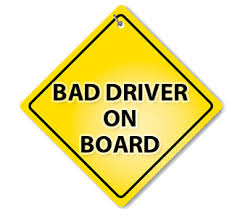Illusory Superiority and My Below Average Driving Skills
Do you think you are an above-average driver? How do you compare with others as a parent? Are you better than most at dancing? On a scale of 1-10, with 10 being highest and 5 being average, where do you rank as a human being?
Regardless of your answer, statistically speaking many of you will answer these questions incorrectly. For some of these skills, you will think you are better than you actually are, and not by a little, but by a lot.
In a famous study from 1981, researchers asked people to rate their driving ability. More than 90 percent considered themselves above average. The irony is that by definition, only 50% of you can be above average, the remaining dolts must be considered below average. Yes, you might in fact be a good driver, but still be below average.
According to noted expert and Cornell psychologist, “The phenomenon, known as illusory superiority, (thinking you are better at something than you actually are), is so stubbornly persistent that I would be surprised if it didn't show up in all studies in which people rate themselves."
Now for the real question. Do you think you’re an above average teacher? Yes?
If you answered yes, it turns out you're not alone. In an often cited study more than 90 percent of faculty members at one state university considered themselves above-average teachers. Even though you teach music, you know the math doesn't add up on this one. It turns out that as a profession, educators experience illusional superiority at a much higher rate than most other professions.
Yes, we teachers are a remarkably confident group. In fact, we're down right cocky!. How did we become so self-assured? How is that teachers have developed such a high degree of confidence? How do we know were so good? Apparently all you have to do is ask us. We'll be happy to tell you!
One group seems to be immune to such self-aggrandizement: our music students.
Anecdotally speaking, student musicians are hard on themselves. I can tell you that in my travels I have found that most students vastly underestimate themselves as musicians. On a more empirical level, when I taught, as a part of every playing test, I would require the students to grade themselves prior to receiving my grade. In over 1,000 individual student tests, only once did a student ever give themselves a higher score than I did. On a personal level, my son refuses to believe that he is an above average player despite having taken private lessons for seven years and having a music teacher for a father. His self-doubt trumps my college education.
How could my students and my son be so wrong in their assessment? Was it something I said or did (or did not say or do) to make them feel this way?
Did I not help them to realize that they were learning a foreign language?
Did I not communicate that mastering an instrument was not something that could be done in just a few years but would require a few decades?
Did I not teach them that they were developing their brains in a way that their non-musical peers weren’t?
Did I not make it clear that just by being in the room, they were already in the top quarter compared to their peers?
Most importantly… How did I not teach my students that music was not a competition or something you compare and contrast. That they were all unique individuals, with different starting points, developmental speeds, and on different journeys?
I honestly don’t know and can’t remember but I do know that I wish I had been less concerned about how I thought I ranked and more concerned with how my students felt they ranked. I could have and should have done better.
And all of this time I thought I was an above average teacher. Clearly it was I who suffered from Illusory Deception.

